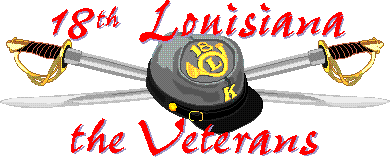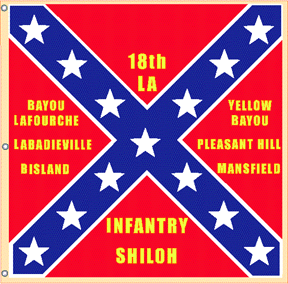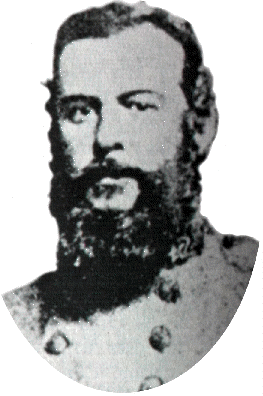Upon the organization of the 18th
Regiment, Capt. Alfred Mouton of Lafayette Parish was
elected colonel. He was a son of the venerable ex-Governor
Mouton , who still resides in the vicinity of Vermilionville
in the above parish. The colonel was a graduate of West
Point, but not having any desire to be a soldier in peace,
he resigned from the army and became a planter in the
prairies in which he had been born and raised.
During the troubles among the inhabitants of the
Attakapas and Opelousas countries previous to the war, he
had taken an active part on the side of honesty and justice
in the effort to disperse the organized band of scoundrels
who roamed over the prairies robbing and pillaging in
defiance of law and its officers.
He was one of the finest looking officers I ever saw,
having a large, robust form, fully developed, with a strong,
commanding voice.
As a drillmaster, he had few, if any, equals. I have seen
him drill the regiment for an hour in a square, the sides of
which ware equal to the length of his line of battle,
without once throwing a company outside or recalling a
command when given.
He was a strict disciplinarian and allowed no deviation
from orders either by officers or soldiers.
Whilst off duty, he mingled freely with his soldiers and
was exceedingly proud of his regiment, always greeting any
member kindly whenever he met him, even after he had been
promoted to a higher position. He always insisted on having
the 18th under his command.
In the first skirmish we had with the enemy at Pittsburg
Landing on the 2d day of March 1862 , he convinced his
soldiers that he was equally as brave and gallant under fire
as he was efficient and capable in camp.
During the terrible days of Shiloh when he was under the
command of a brave but unskilled officer, his anxiety for
the safety of the men under his command was very evident to
us all , and the bad management of the brigade seemed to
annoy and worry him exceedingly.
And when at last our regiment was ordered to charge the
enemy and leave almost half of our strength upon that bloody
hill, seeing that we had not been supported by the other
regiments who were sent forward one by one to meet a fate
similar to ours and realizing the destruction of his men
when a proper movement would have proven a victory, driven
this enemy away, and saved hundreds of our gallant men who
had fallen before our eyes, his emotions overcame him, and
he wept like a child. Gathering his scattered remnants
together, he watched over them during the night and again
the next day led them into the midst of the battle, when he
was wounded and compelled to leave the field. He was but a
few feet behind his men when he fell from his horse.
The wound was apparently but trifling, but on returning
to our camp at Corinth, Erysipelas set in and he was
compelled to return to New Orleans, where his life was in
imminent danger for several days. The city fell, and he
escaped over the river in sight of the Federal fleet coming
to take possession of New Orleans.
It was not until October that he became sufficiently
recovered to take the field, having in the meantime been
promoted to a brigadier generalship.
He met the 18th in October, a few days after our return
to this side of the Mississippi River, and the first
military duty he performed was in command of a detachment
from his old command. I remember how warmly he expressed his
gratification at being with his old regiment when he
rebuckled his sword for the contest.
He was in command of the Lafourche District in 1862 when
Gen.Weitzel made his triumphant march down our bayou. On the
day the fight took place at Winn's road, he was suffering so
severely with rheumatism that he could not participate.
After the retreat, he remained in command of the Teche
country during the winter and in February 1863 fought the
first fight at Bisland's, driving the enemy back.
In April the retreat from Bisland occurred and continued
as far as Natchitoches.
When the Federals fell back, he took command of cavalry
and proceeded down the Calcasieu country towards Niblett' s
Bluff and thence to Opelousas and New Iberia. Following up
the retreating Federals to this Place [Thibodaux], he was in
active duty whilst we remained here in 1863.
After the Lafourche had been evacuated, he was placed in
command at Vermilionville and afterwards shared all the ups
and downs of the army until the fatal day at Mansfield,
where he fell, basely murdered by men whose lives he had
just saved after one of the most brilliant charges made
during that extraordinary campaign and in the moment that
victory was crowning him with her laurel wreaths. He was
buried in the cemetery at Mansfield by the side of the
heroic Armant, Martin, and Beatty, who had fallen at the
same time. Since the war his remains have been brought to
the family cemetery at Vermilionville, where they now repose
in quiet by the side of those he loved so well and where his
tomb is daily freshened by the gentle gales of his native
land.
He who stands by the grave of Alfred Mouton looks upon
the dust of honest man and an upright citizen, a hero and a
patriot.
Of all the glorious dead of Louisiana, who for their
country's freedom gave up their lives and "passed over the
river to rest under the shadow of the trees," in the Lost
Cause none deserves a brighter niche in the Temple of Fame
than does this gallant son of Attakapas. May the memory of
his virtues and heroism be ever embalmed in the hearts of
the sons of Louisiana.
No officer in the Confederate service was more
universally beloved by his soldiers, whilst living, nor more
sincerely mourned when he passed from earth in the discharge
of his duty at the very moment when he was conscious that
the day was his and that he and his own cherished division
were the victors of the bloody battle of Mansfield. The line
of the enemy had been broken from left to right, Nims'
famous and boasted battery had been captured, two thousand
prisoners had thrown down their arms , and the general had,
by that quick, peculiar glance of his brilliant eye, seen
that the day was won and hnad sent his aides in different
directions with the necessary orders to secure the fruits of
the victory and arrest further destruction of life.
Notwithstanding he had witnessed the fall of the gallant
Armant, the chivalric Canfield, the intrepid Beard, the
fearless Clack, the brave Walker, the daring Martin, the
cool and heroic Beatty, and hundreds of his own valiant
troops as they surmounted every obstacle in their path, yet
to save the lives of those men who had slain his beloved
soldiers, he had ridden forward alone, calling upon them to
throw down their arms, as being surrounded, they could not
escape. Passing near a bunch of brambles in which some
Federal soldiers had concealed themselves and thrown down
their arms , they, perceiving the general to be alone,
picked up their guns and treacherously fired upon him.
Falling from his horse, pierced through the breast and heart
with seven balls, the noble and gallant hero breathed his
last before any of his friends had reached his side.



